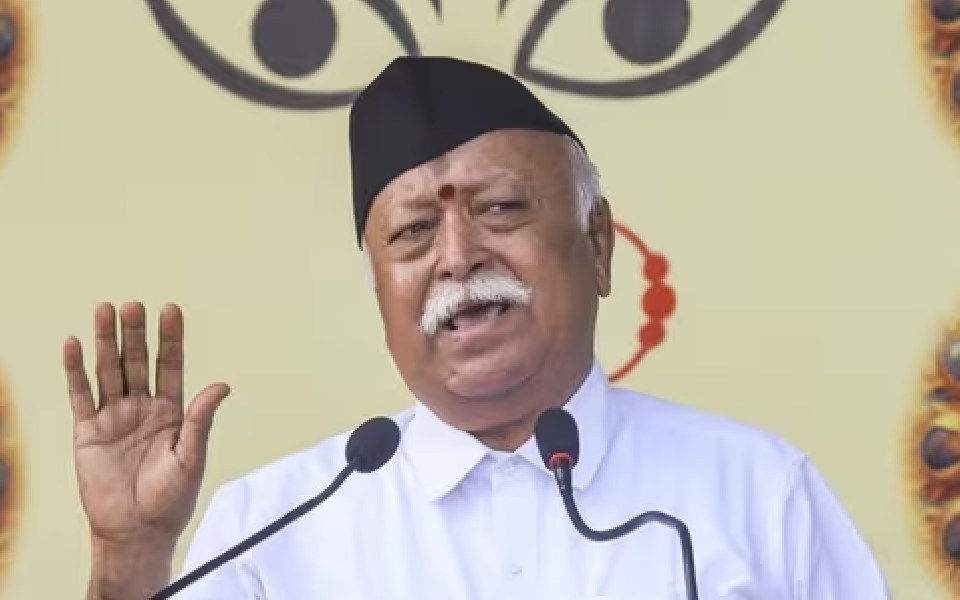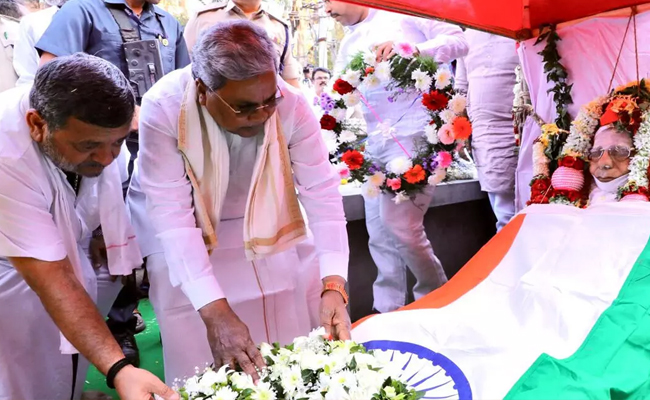Nagpur: Rashtriya Swayamsevak Sangh (RSS) Sarsanghchalak Mohan Bhagwat on Wednesday said that after the age of 75, individuals should step aside and allow others to take up responsibilities. He was speaking at a book launch event held at Vanamati Hall in Nagpur, where an English biography based on senior RSS leader Moropant Pingale’s life was released.
Remembering Moropant Pingale, who held key positions within the Sangh, Bhagwat said that the decision to honour Pingale on his 75th birthday was taken during an RSS meeting in Vrindavan. At that time, then Sarkaryavah (general secretary) H.V. Sheshadri had honoured him with a traditional shawl. Bhagwat recalled Pingale’s words during that event: “I understand what turning 75 means.”
Bhagwat described this as one of the key life lessons taught by Pingale — that one must continue to work for the Sangh without seeking personal recognition and voluntarily retire at 75.
Referring to the political scenario after the Emergency period, Bhagwat spoke about Pingale’s ability to foresee outcomes. He shared an incident where, during discussions ahead of the general elections, Pingale had predicted that if all opposition parties came together, they would win around 276 seats. This exact number, Bhagwat pointed out, turned out to be accurate. Interestingly, Bhagwat said Pingale was at the Sajjangarh Fort in Satara district, away from political chatter, when the election results were announced.
Highlighting Pingale’s self-effacing nature, Bhagwat said that during the Ram Janmabhoomi movement, Pingale pushed Ashok Singhal to the forefront while choosing to stay in the background. “He never tried to project himself, and his actions reflected a deep sense of sacrifice and humility,” Bhagwat said.
He added that from childhood, Pingale practiced the difficult path of self-renunciation and never harboured personal ambitions despite his dedication to the Sangh.
Let the Truth be known. If you read VB and like VB, please be a VB Supporter and Help us deliver the Truth to one and all.
Bengaluru (PTI): Veteran Congress leader Shamanuru Shivashankarappa was laid to rest with full state honours on Monday.
The 94-year-old former minister, who passed away at a private hospital in Bengaluru on Sunday, was cremated at the Kalleshwara Mill premises, following Veerashaiva-Lingayat traditions.
Earlier in the day, Shivashankarappa's mortal remains were brought to his native Davanagere, where they were kept at the high school grounds for the public, his followers, and well-wishers to pay their last respects.
ALSO READ: Karnataka Speaker U T Khader condoles death of Shamanur Shivashankarappa
Expressing deep sorrow over his demise, the Karnataka government ordered that his last rites be performed with full state honours.
Both the Karnataka Legislative Assembly and Council also mourned his passing, adjourning their sessions for the day after paying tributes.
Chief Minister Siddaramaiah, Deputy CM D K Shivakumar, AICC President Mallikarjun Kharge, veteran BJP leader B S Yediyurappa, several ministers, opposition leaders, legislators, and political figures paid their respects.
A number of seers from the Veerashaiva-Lingayat community also attended the last rites.
Shivashankarappa represented the Davanagere South Assembly constituency. He had been undergoing treatment at the hospital for some time before succumbing to age-related ailments.
The senior-most legislator in Karnataka, Shivashankarappa, was also one of the longest-serving lawmakers in the country, sources said.
He is survived by three sons, including S S Mallikarjun, the Karnataka Minister for Mines, Geology, and Horticulture, and four daughters. His daughter-in-law, Prabha Mallikarjun, is the Member of Parliament from Davanagere.
A six-time MLA, Shivashankarappa also served as a minister and an MP.
He was a prominent educationist, establishing several educational institutions, and was an industrialist.
Additionally, he served as the treasurer of the Karnataka Pradesh Congress Committee (KPCC) for decades and was the president of the All India Veerashaiva Mahasabha, the apex body of the influential Veerashaiva-Lingayat community.





